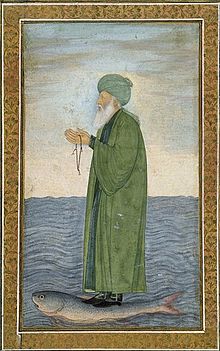 |
| Al-Khidr. Web Source: Wikipedia. |
One theme from the first half of the reading that came up again in the second is the search for eternal life. This is a pretty common theme around the world, including in the Epic of Gilgamesh, but I was somewhat surprised to find it in when the characters expect to life forever in Paradise. Adam wished for fruit from the tree of life but did not get it. Abraham and Moses were both, at least according to some accounts, promised the possibility of choosing their own time of death, but had to be tricked into choosing it as neither of them wanted to die. I am curious as to what the relationship is between these folktales and the Quran.
I was very surprised by the part of the story of David where he learned from his people that he ought to earn his own living - and actually took up a trade. I find it rather ironic that he became an armormaker, as when he fought Goliath he refused King Saul's armor. But I'm even more impressed that he actually took up a trade because his people thought it was right. While in general I do think it makes sense for the ruler to be compensated financially so they can focus on ruling and not have conflicts of interests, I appreciate the humility and desire for fairness that his actions show.
El Khudr (or Al-Khidr) is interesting as he combines so many different figures, including Phinehas (a priest of Israel), Elijah the prophet, John the Baptist, Vishnu, and St. George. I am not entirely sure how he can be all of those people - I suppose each is a manifestation of the underlying, immortal person of Al-Khidr. It would be amusing if he had a friend who was also immortal and got very confused as to who he was whenever their paths crossed.
Bibliography: J. E. Hanauer's Folklore of the Holy Land, link.
Aucun commentaire:
Enregistrer un commentaire